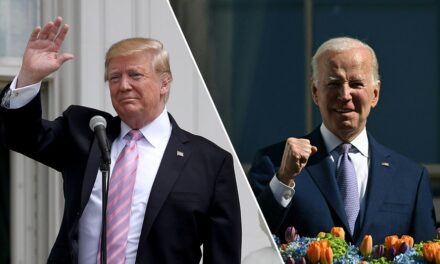As tensions rise in regions around the globe, the heart-wrenching plea of a father for his son has captured the attention of many. Edan Alexander, an American citizen, is currently being held hostage in an undisclosed location, and his father has made an emotional appeal to former President Donald Trump, urging him to utilize his influence to secure his son’s release.
The plight of Edan Alexander has not only affected his family but also shed light on the complexities of hostage situations and the government’s role in such crises. Edan’s father, whose name has not been disclosed to protect the family’s privacy, participated in a recent interview where he expressed deep concern for his son’s safety. Emphasizing the urgency of the matter, he stated, “I just want my son to come home safely. I believe President Trump can help make that happen.”
This appeal follows a series of high-profile negotiations surrounding the return of hostages in various conflicts worldwide. The family has been shocked to find themselves in this troubling situation, highlighting the unpredictable threat of international kidnapping, which often becomes more intense during instances of political unrest.
Edan was reportedly taken hostage while abroad for work, igniting fears and anxiety among his friends and family. While the details regarding the particular circumstances of his abduction remain scarce, it is known that the conditions of his captivity are dire. His father described him as a caring and adventurous individual who always sought opportunities to contribute positively to society.
The father’s call for assistance underscores a widespread concern surrounding hostage-taking and the extent to which governments intervene on behalf of their citizens. Many families in similar situations have grappled with uncertainty and despair, often unsure of the best course of action for their loved ones. The emotional toll on families of hostages is immense, often leaving them to navigate complex negotiations and media interactions, all while trying to maintain hope.
Former President Trump has maintained a public presence and involvement in various international matters since leaving office, including discussions around the secure release of American hostages. His administration was noted for its aggressive stance on foreign affairs, particularly regarding negotiations with countries deemed hostile or antagonistic towards the United States. The father of Edan Alexander hopes that Trump could leverage his experience and connections to expedite his son’s return.
The family is aware of the global implications of hostage situations and the risks involved in negotiating with captors. The father expressed that he fully understands the delicate nature of such discussions, acknowledging that any misstep could jeopardize his son’s safety. “We are pleading for his safe return. We are willing to cooperate with any necessary steps to see him home,” he stated.
The family’s outreach aligns with a broader movement among families of hostages and detainees, who are increasingly vocal about their loved ones’ cases, urging both governmental and non-governmental organizations to take action. With social media platforms providing them with an avenue to share their stories, they have found a collective voice in raising awareness about their situation, motivating public engagement and attention.
As discussions of Edan Alexander’s case unfold, it prompts reflections on the responsibilities of governments when citizens are taken hostage abroad. Many advocate for the establishment of robust frameworks that prioritize the safety of hostages, with policymakers encouraged to develop strategies that not only work towards recovery but also to deter future incidents. Americans watching this situation develop are likely to debate the effectiveness of existing policies surrounding hostage negotiations, especially in the rapidly evolving landscape of international relations.
Congress has been advocating for increased transparency and resources dedicated to handling hostage cases. Given the complexity of these situations, family members often feel left out of the process, illustrating a desperate need for reform. The emotional toll of such experiences frequently leads families to demand more accountability from their leaders, prompting a significant dialogue about the balance between diplomacy, national security, and the protection of American citizens abroad.
Public sentiment regarding hostage situations can vary, often influenced by political views, the nature of the capture, and the hostages’ backgrounds. While many rally around families in distress, some critiques may arise around government negotiations with captors. Nevertheless, the primary focus remains on the welfare of the individuals who are being held and the desperation of families seeking their safe return.
Substantial support from various sectors, including advocacy groups and fellow Americans, has emerged surrounding Edan Alexander’s case. Online campaigns for awareness and aid have garnered traction, showcasing the power of community support. Activists and concerned citizens have taken to social media, sharing hashtags and calls for action, hoping to put additional pressure on decision-makers to prioritize the safe return of hostages like Edan.
The fragility of human life has been spotlighted in Edan’s situation—one that resonates deeply in an age where global travel is commonplace, yet the threat of hostage situations looms. As the days pass with no news, tension continues to build within the Alexander family, who remain hopeful yet fearful for Edan’s fate. His father’s public plea serves as both a cry for help and a significant reminder of the ongoing struggles faced by many families worldwide.
In conclusion, the distressing situation surrounding Edan Alexander emphasizes the need for strong governmental advocacy and community involvement in securing the safe return of hostages. As the Alexander family continues to navigate this tumultuous time, the hope remains that influential figures, including former President Trump, may play a pivotal role in resolving this heartbreaking situation. The call for Edan’s release should echo not only as a personal plea but also as a broader reminder of the importance of protecting American citizens abroad. May Edan’s journey towards home be swift and safe, and may his family’s story prompt necessary dialogues surrounding foreign policy, safety, and the urgent need for change.
































